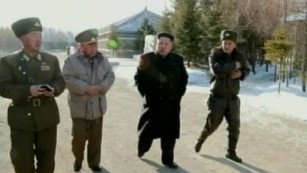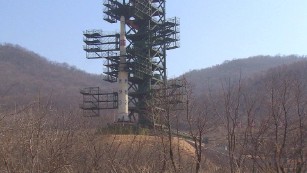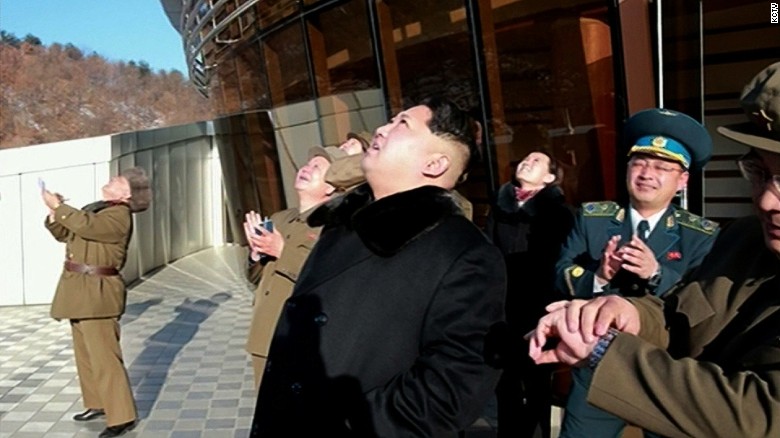U.N. Security Council condemns North Korean rocket launch
North Korea launched a satellite into space Sunday, its state media reported, triggering a wave of international condemnation and prompting strong reaction from an emergency meeting of the U.N. Security Council.
Though North Korea said the launch was for scientific and "peaceful purposes," it is being widely viewed by other nations as a front to test a ballistic missile, especially coming on the heels of North Korea's purported hydrogen bomb test last month.
Pyongyang carried out both acts in defiance of international sanctions.

Official: N. Korea possibly tested H-bomb components
At an emergency meeting Sunday, members of the U.N. Security Council "strongly condemned" the launch and reaffirmed that "a clear threat to international peace and security continues to exist, especially in the context of the nuclear test."
Security Council members have previously threatened "further significant measures" if there was another North Korean launch and now will "adopt expeditiously a new Security Council resolution with such measures in response to these dangerous and serious violations," according to a statement read by Venezuela's ambassador to the United Nations after the meeting.
U.N. Secretary-General Ban Ki-moon said the launch is "deeply deplorable" and in violation of Security Council resolutions "despite the united plea of the international community against such an act.
Warning shots fired
South Korean President Park Geun-hye called the launch a "challenge to world peace," while her government announced it would begin talks with the U.S. to deploy a defense system called Terminal High Altitude Area Defense, which can intercept missiles in flight.
It also planned to reduce the personnel at the Kaesong Industrial Complex, a joint economic development zone between the two Koreas, from 650 to 500 "in consideration of safety of our people," the South Korea Unification Ministry said.
With tensions high, South Korea fired warning shots Monday morning after a North Korean patrol boat crossed the maritime border between North and South Korea, South Korea's Defense Ministry said.
The North Korean boat withdrew about 20 minutes later, the ministry said.
Such incidents are not uncommon, CNN's Paula Hancocks reports. But the timing of this one -- so soon after North Korea's rocket launch -- will likely bring additional scrutiny to the incident, she said.
Satellite in orbit
The Kwangmyongsong carrier rocket blasted off from the Sohae launch facility at 9 a.m Sunday (7:30 p.m. ET Saturday), entering orbit nine minutes and 46 seconds after liftoff, North Korea's state news agency KCNA reported.
A state TV newsreader said that the launch had been personally ordered and directed by North Korean leader Kim Jong Un, who was pictured smiling in official photographs as he oversaw the launch, and that more satellite launches were planned.
A senior U.S. defense official said the rocket headed toward space and, based on its trajectory over the Yellow Sea, "did not pose a threat to the U.S. or our allies."
At least two new objects have been detected in Earth's orbit and are being tracked, a spokesman for U.S. Strategic Command told CNN on Sunday. The objects appeared to be the satellite and the final stage of the rocket booster, said arms control expert David Wright, co-director of the Union of Concerned Scientists Global Security Program.
South Korea retrieved a piece of debris believed to be a part of the missile Sunday morning, a Defense Ministry official told CNN. The object was recovered from the ocean by a South Korean navy vessel and is being analyzed, the official said.
Japan's analysis of the launch indicated parts of the rocket fell in four locations offshore after takeoff, the Japanese Prime Minister's office said via Twitter.
A South Korean lawmaker said Sunday that intelligence on the launch suggested that it had likely been timed to coincide with the NFL Super Bowl and Chinese New Year, in order to maximize international media impact.
"The date of the launch appears to be in consideration of the weather condition and ahead of the Lunar New Year and the U.S. Super Bowl," said Jo Ho-young, chairman of the South Korean National Assembly Intelligence Committee.
Swift condemnation
The United States, South Korea, Japan, China, Russia, Britain and France, as well as the European Union and NATO, were swift to condemn the launch.

North Korea: Satellite launch or missile test?
China summoned North Korea's ambassador to protest Pyongyang's launch of a satellite using ballistic missile technology, the Chinese Foreign Ministry said.
It also criticized the plans for South Korean-U.S. missile defense system talks and summoned the South Korean ambassador over the matter.
News Courtesy: www.cnn.com











